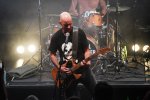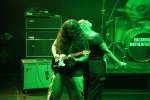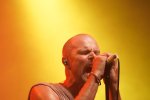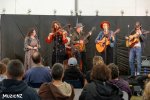Fats White - Interview with Brent Hayward from Fats White
07 Jun 2007 // An interview by Shade
 An original self taught do it yourself artist Brent Hayward is one of the most distinctive voices in New Zealand music and film. In a career stretching back over 25 years he has organized his own gigs and recording sessions, made his own posters and self-released his music. Hell, he even wrote his own songs and made his own music videos. Today he is a member of the band FATS WHITE voted as Auckland's best band in 2005 by Metro Magazine.
An original self taught do it yourself artist Brent Hayward is one of the most distinctive voices in New Zealand music and film. In a career stretching back over 25 years he has organized his own gigs and recording sessions, made his own posters and self-released his music. Hell, he even wrote his own songs and made his own music videos. Today he is a member of the band FATS WHITE voted as Auckland's best band in 2005 by Metro Magazine.
Hayward started out with the punk rock band SHOES THIS HIGH in Wellington in the late 1970s before carrying on as SMELLY FEET, THE KIWI ANIMAL then forming FATS WHITE (Phats Blanco). In the early 1980s he began making films and videos reminiscent of Nick Zedd's Cinema of Transgression in New York. Hayward's films include, MUDSLINGING (1984), BEAT IT (1986), SLICK (1989), MONDO BIKO (1991) MANAWANUI, THE CONFESSIONS OF JOHNNY BARCODE and many others.
Martin Rumsby ventured on to Auckland's Karangahape Road in an attempt to locate and pin down the performer once known as THE REVEREND STINKFINGER.
MR: I first met you when you turned up uninvited at the New Artists New Art Exhibition at the Govett-Brewster Art Gallery in New Plymouth in 1982. You sang songs and sold your comic books. You had an edgy, nervous kind of energy.
Brent Hayward: Uninvited yeah. I still am edgy. I was kind of like the world’s orphan. I was rejecting the normal conventions. I wanted to make music that your Mama would hate. To be deep. To cut through crowds and different scenes. To be able to go uninvited. To make music that could get through all the walls and doors. People either hate it or they really love it. Wild music with feeling, soul, energy and spirit.
MR: Sometime later you popped up at Alternative Cinema in Auckland and Christopher Barrett started making music videos of you. First as SMELLY FEET, then later with Julie Cooper as part of the musical duo THE KIWI ANIMAL.
BH: I was keen. I had been a bit of a runaway. Running away from school, running away from relationships.
MR: Sometimes you seemed like a forlorn beggar.
BH: You guys at Alternative Cinema and some others didn’t slam the door in my face.
MR: Any door that is open.
BH: That’s right. Sometimes you don’t know what is behind the door. But a lot of the time normal civilization says that you should know what is behind the doors and that you should know exactly where you are going. From the cradle to the grave. No thanks. Sometimes it is good to be upset and uncomfortable.
MR: I would defy any artist to know where they are going.
BH: I am just like a fish trying to jump out of the water, looking for some land, looking for an island, looking for a rock. Think of me as your ethnic Indian Maori white trash shithead working class immigrant dog. I am a dog. It was music that got me into circulation. I didn’t want to live in a world where I would be standing still. I wanted to be involved.
MR: Socially involved, culturally involved?
BH: Everything. To be current. To be circulating with myself and those around me and to contribute. I like to be passionate about whatever I am in to. Making things. I like opening doors and windows everywhere. Just like a burglar. If I see a window open somewhere I hop on in. I go for it. I was a burglar. I never got caught. I like telling the truth.
MR: You like rubbing people’s noses in it too.
BH: I have done. I’m surprised that I didn’t get my arse whipped more than I did. But here I am now, with forty five and a half years of skin hanging off my bones.
MR: What is music to you?
BH: For me it is something free, something that is not owned by a corporation. It’s a spiritually awakening eye opener. Music took me to places I would not have otherwise gone to. Music wants to travel. If you are an instrument of it then music opens your mind. You travel from town to town, you pass through different places and scenes. You see life going on. I go along a path, like a fish swimming up a stream, being a branch, extending the tree of life.
MR: Is the process of creating more important for you than the end result?
BH: Sometimes. It is always nice to have a piece. Something to hold, something to look at … making films like THE CONFESSIONS OF JOHNNY BARCODE were like nine or ten years of madness.
MR: That involved some illegal shooting?
BH: Breaking into buildings. Managing to rustle and hustle people together. Sometimes up to twenty people all at once. I would dress them in overalls and gorilla masks then take them walking down the street. They would ask, “How come we are going here?” Then we would get to a downtown building that I had broken into earlier and opened the front door and we would go up onto the roof and start filming. Sometimes the cops would come. One time they flew over in a helicopter, looking at us.
MR: Watching your staged parades of goose stepping fascist automatons.
BH: Another time we got into a restricted area at the airport. I lined the actors up along a fence in their masks and overalls and had them act out poses from Leni Reifenstahl’s TRIUMPH OF THE WILL. The cops told us to go away because, they said, the airport was for tourists and normal people and, according to them, we weren’t normal.
MR: You used filters, wide angle lenses, dramatic camera angles and colour distortions.
BH: That’s right. Working as a projectionist at the Auckland Film Society I got to see and study films and to think about sub-titles. The mass population cannot handle sub-titles. I was seeing these films then I started thinking like a foreigner. I started talking like one, then people started taking me for one.
MR: And you created images like a man filming a woman brandishing a broad sword while she dances on top of a car from which hang decapitated, skinned cattle heads. They seem to dance in the blood of the moon.
BH: I was into Black Magic and rituals with some other boys and girls behind the scenes. Little secret societies that do exist.
MR: Where do you show your films?
BH: All over. The funniest one, to me, was this Aussie guy who got a copy of a film I did. A film which is now restricted, apparently, in the New Zealand Film Archive. Nobody can watch it. He got a copy after it was shown in Bondi. This little five minute long film called SLICK.
MR: In which a group of men dressed up as sailors cavort with one another in a public toilet.
BH: And more. Anyway, this Aussie guy got a copy of SLICK then he got a job on a TV show in New York. He put SLICK on the show and out on the airwaves in New York. The show was stopped and an apology was aired. The Aussie guy got bailed up by some cowboys who pushed him around. Genesis P Orridge from THROBBING GRISTLE sent a message saying that he thought it was really good TV.
SLICK was subsequently picked up by a German film curator, Jurgen Bruning, who screened it widely throughout North America and Europe.
MR: You used to send invitations to your shows to the Prime Minister and other dignitaries.
BH: Yeah.
MR: Did they turn up?
BH: They would always write a letter. They sent word that they were very sorry that they couldn’t make it.
MR: Some of your films were self funded by money that you made as a sex worker.
BH: Yeah. I wasn’t a sex worker for that long but there was a time when I needed money for filters and other camera attachments. I was passionate about getting what I wanted … which led to a darker cinema. I was learning about the tools of my trade, which also happened to be the humans I was dealing with. Things like having sex and getting paid for it was a lesson. How people have primal urges for things. That is an interesting area. A lot of people shy away from it, of course. Sometimes I liked doing that.
MR: Did you make your own soundtracks?
BH: Most of the time I did. With film it became more and more apparent that the sound I was doing was different from what I had been doing before. I found myself thinking about what sounds to put with the pictures. I was shooting silently. I always did the sound later. I had come from a punk, skinhead, boot boy era. I went from making anti-establishment music with SHOES THIS HIGH to embracing music and human emotions in THE KIWI ANIMAL to this filmmaking thing in which everything is held at bay, only to be used wisely, sparingly and abusively.
MR: Are you a moralist?
BH: Maybe knowing that there are limitations and poking fun at those limitations. Better to be the King of Comedy for a night than a schmuck for a lifetime.
MR: How did you get back into music?
BH: Johnny Cash was getting sick … The Big O had gone. The bright lights were showing VACANCY on the building next door. The day after Johnny died our band FATS WHITE performed a tribute for him. I didn’t want to be known as the dude that made smutty films. I didn’t want to make a career of one thing. I didn’t want to repeat myself. I started looking at myself and asking, “What can I find rather than what I am used to?” I replaced my camera with a guitar.
MR: Some of the music that you are now making with FATS WHITE is apocalyptic, sounding like a cross between Captain Beefheart, Jim Morrison, Tom Waits and Ramsay Midwood.
BH: I am aware of the apocalypse. I have been reading the Book of Revelations. That is where I am at. I have come from an era of vulgarity in the 1990s. I outgrew Black Magic because those people were too conservative. When I started stealing off my brothers they didn’t like it. So I said, “Hey. Wait a minute. You say, ‘Do what thou will shall be the whole of the law.’ That means going for broke every time.” I found limitations there so I had to look to myself.
MR: Are you recording?
BH: FATS WHITE is working on an album right now. It is an interpretation. With our process of recording we don’t know how it will come out. It is not programmatic. What is the point of doing anything if you know what the end result will be? I really want to write good songs.
MR: Do you think about writing melodies and choruses?
BH: All of that. I want it all. We want to make songs and music in a free way.
MR: Phil Dadson described your performances as having a haphazard, shambolic sort of feeling.
BH: Yeah. It is shambolic. It’s fun. We are open to songs and music for weddings, parties and funerals. We do funerals for free. We have incorporated our filmmaking skills back into the music. We’ve made a video which we are trying to get shown on TV.
MR: Were you included in New Zealand Music Month?
BH: No.
MR: Who was in charge?
BH: Not the musicians. They never have been.
MR: What would Mike Chunn say if you told him that?
BH: He said, ‘Play it strange.’ Well we do.
Recorded with support from the Oral History Awards, Ministry For Culture and Heritage.
Thanks to Martin Rumsby for supplying this interview.
 An original self taught do it yourself artist Brent Hayward is one of the most distinctive voices in New Zealand music and film. In a career stretching back over 25 years he has organized his own gigs and recording sessions, made his own posters and self-released his music. Hell, he even wrote his own songs and made his own music videos. Today he is a member of the band FATS WHITE voted as Auckland's best band in 2005 by Metro Magazine.
An original self taught do it yourself artist Brent Hayward is one of the most distinctive voices in New Zealand music and film. In a career stretching back over 25 years he has organized his own gigs and recording sessions, made his own posters and self-released his music. Hell, he even wrote his own songs and made his own music videos. Today he is a member of the band FATS WHITE voted as Auckland's best band in 2005 by Metro Magazine.Hayward started out with the punk rock band SHOES THIS HIGH in Wellington in the late 1970s before carrying on as SMELLY FEET, THE KIWI ANIMAL then forming FATS WHITE (Phats Blanco). In the early 1980s he began making films and videos reminiscent of Nick Zedd's Cinema of Transgression in New York. Hayward's films include, MUDSLINGING (1984), BEAT IT (1986), SLICK (1989), MONDO BIKO (1991) MANAWANUI, THE CONFESSIONS OF JOHNNY BARCODE and many others.
Martin Rumsby ventured on to Auckland's Karangahape Road in an attempt to locate and pin down the performer once known as THE REVEREND STINKFINGER.
MR: I first met you when you turned up uninvited at the New Artists New Art Exhibition at the Govett-Brewster Art Gallery in New Plymouth in 1982. You sang songs and sold your comic books. You had an edgy, nervous kind of energy.
Brent Hayward: Uninvited yeah. I still am edgy. I was kind of like the world’s orphan. I was rejecting the normal conventions. I wanted to make music that your Mama would hate. To be deep. To cut through crowds and different scenes. To be able to go uninvited. To make music that could get through all the walls and doors. People either hate it or they really love it. Wild music with feeling, soul, energy and spirit.
MR: Sometime later you popped up at Alternative Cinema in Auckland and Christopher Barrett started making music videos of you. First as SMELLY FEET, then later with Julie Cooper as part of the musical duo THE KIWI ANIMAL.
BH: I was keen. I had been a bit of a runaway. Running away from school, running away from relationships.
MR: Sometimes you seemed like a forlorn beggar.
BH: You guys at Alternative Cinema and some others didn’t slam the door in my face.
MR: Any door that is open.
BH: That’s right. Sometimes you don’t know what is behind the door. But a lot of the time normal civilization says that you should know what is behind the doors and that you should know exactly where you are going. From the cradle to the grave. No thanks. Sometimes it is good to be upset and uncomfortable.
MR: I would defy any artist to know where they are going.
BH: I am just like a fish trying to jump out of the water, looking for some land, looking for an island, looking for a rock. Think of me as your ethnic Indian Maori white trash shithead working class immigrant dog. I am a dog. It was music that got me into circulation. I didn’t want to live in a world where I would be standing still. I wanted to be involved.
MR: Socially involved, culturally involved?
BH: Everything. To be current. To be circulating with myself and those around me and to contribute. I like to be passionate about whatever I am in to. Making things. I like opening doors and windows everywhere. Just like a burglar. If I see a window open somewhere I hop on in. I go for it. I was a burglar. I never got caught. I like telling the truth.
MR: You like rubbing people’s noses in it too.
BH: I have done. I’m surprised that I didn’t get my arse whipped more than I did. But here I am now, with forty five and a half years of skin hanging off my bones.
MR: What is music to you?
BH: For me it is something free, something that is not owned by a corporation. It’s a spiritually awakening eye opener. Music took me to places I would not have otherwise gone to. Music wants to travel. If you are an instrument of it then music opens your mind. You travel from town to town, you pass through different places and scenes. You see life going on. I go along a path, like a fish swimming up a stream, being a branch, extending the tree of life.
MR: Is the process of creating more important for you than the end result?
BH: Sometimes. It is always nice to have a piece. Something to hold, something to look at … making films like THE CONFESSIONS OF JOHNNY BARCODE were like nine or ten years of madness.
MR: That involved some illegal shooting?
BH: Breaking into buildings. Managing to rustle and hustle people together. Sometimes up to twenty people all at once. I would dress them in overalls and gorilla masks then take them walking down the street. They would ask, “How come we are going here?” Then we would get to a downtown building that I had broken into earlier and opened the front door and we would go up onto the roof and start filming. Sometimes the cops would come. One time they flew over in a helicopter, looking at us.
MR: Watching your staged parades of goose stepping fascist automatons.
BH: Another time we got into a restricted area at the airport. I lined the actors up along a fence in their masks and overalls and had them act out poses from Leni Reifenstahl’s TRIUMPH OF THE WILL. The cops told us to go away because, they said, the airport was for tourists and normal people and, according to them, we weren’t normal.
MR: You used filters, wide angle lenses, dramatic camera angles and colour distortions.
BH: That’s right. Working as a projectionist at the Auckland Film Society I got to see and study films and to think about sub-titles. The mass population cannot handle sub-titles. I was seeing these films then I started thinking like a foreigner. I started talking like one, then people started taking me for one.
MR: And you created images like a man filming a woman brandishing a broad sword while she dances on top of a car from which hang decapitated, skinned cattle heads. They seem to dance in the blood of the moon.
BH: I was into Black Magic and rituals with some other boys and girls behind the scenes. Little secret societies that do exist.
MR: Where do you show your films?
BH: All over. The funniest one, to me, was this Aussie guy who got a copy of a film I did. A film which is now restricted, apparently, in the New Zealand Film Archive. Nobody can watch it. He got a copy after it was shown in Bondi. This little five minute long film called SLICK.
MR: In which a group of men dressed up as sailors cavort with one another in a public toilet.
BH: And more. Anyway, this Aussie guy got a copy of SLICK then he got a job on a TV show in New York. He put SLICK on the show and out on the airwaves in New York. The show was stopped and an apology was aired. The Aussie guy got bailed up by some cowboys who pushed him around. Genesis P Orridge from THROBBING GRISTLE sent a message saying that he thought it was really good TV.
SLICK was subsequently picked up by a German film curator, Jurgen Bruning, who screened it widely throughout North America and Europe.
MR: You used to send invitations to your shows to the Prime Minister and other dignitaries.
BH: Yeah.
MR: Did they turn up?
BH: They would always write a letter. They sent word that they were very sorry that they couldn’t make it.
MR: Some of your films were self funded by money that you made as a sex worker.
BH: Yeah. I wasn’t a sex worker for that long but there was a time when I needed money for filters and other camera attachments. I was passionate about getting what I wanted … which led to a darker cinema. I was learning about the tools of my trade, which also happened to be the humans I was dealing with. Things like having sex and getting paid for it was a lesson. How people have primal urges for things. That is an interesting area. A lot of people shy away from it, of course. Sometimes I liked doing that.
MR: Did you make your own soundtracks?
BH: Most of the time I did. With film it became more and more apparent that the sound I was doing was different from what I had been doing before. I found myself thinking about what sounds to put with the pictures. I was shooting silently. I always did the sound later. I had come from a punk, skinhead, boot boy era. I went from making anti-establishment music with SHOES THIS HIGH to embracing music and human emotions in THE KIWI ANIMAL to this filmmaking thing in which everything is held at bay, only to be used wisely, sparingly and abusively.
MR: Are you a moralist?
BH: Maybe knowing that there are limitations and poking fun at those limitations. Better to be the King of Comedy for a night than a schmuck for a lifetime.
MR: How did you get back into music?
BH: Johnny Cash was getting sick … The Big O had gone. The bright lights were showing VACANCY on the building next door. The day after Johnny died our band FATS WHITE performed a tribute for him. I didn’t want to be known as the dude that made smutty films. I didn’t want to make a career of one thing. I didn’t want to repeat myself. I started looking at myself and asking, “What can I find rather than what I am used to?” I replaced my camera with a guitar.
MR: Some of the music that you are now making with FATS WHITE is apocalyptic, sounding like a cross between Captain Beefheart, Jim Morrison, Tom Waits and Ramsay Midwood.
BH: I am aware of the apocalypse. I have been reading the Book of Revelations. That is where I am at. I have come from an era of vulgarity in the 1990s. I outgrew Black Magic because those people were too conservative. When I started stealing off my brothers they didn’t like it. So I said, “Hey. Wait a minute. You say, ‘Do what thou will shall be the whole of the law.’ That means going for broke every time.” I found limitations there so I had to look to myself.
MR: Are you recording?
BH: FATS WHITE is working on an album right now. It is an interpretation. With our process of recording we don’t know how it will come out. It is not programmatic. What is the point of doing anything if you know what the end result will be? I really want to write good songs.
MR: Do you think about writing melodies and choruses?
BH: All of that. I want it all. We want to make songs and music in a free way.
MR: Phil Dadson described your performances as having a haphazard, shambolic sort of feeling.
BH: Yeah. It is shambolic. It’s fun. We are open to songs and music for weddings, parties and funerals. We do funerals for free. We have incorporated our filmmaking skills back into the music. We’ve made a video which we are trying to get shown on TV.
MR: Were you included in New Zealand Music Month?
BH: No.
MR: Who was in charge?
BH: Not the musicians. They never have been.
MR: What would Mike Chunn say if you told him that?
BH: He said, ‘Play it strange.’ Well we do.
Recorded with support from the Oral History Awards, Ministry For Culture and Heritage.
Thanks to Martin Rumsby for supplying this interview.
About Fats White

Fats White is a 2-piece that live on Karangahape Road in Auckland, and have an edge and voice that hails first and foremost from the street. They play anywhere to anyone and have a lot of love for what they do.
Fats White recently opened for Boston band Dresden Dolls.
Visit the muzic.net.nz Profile for Fats White
Releases
Other Interviews By Shade
 MNZ Interview: Muzic Speak S01 / E03 - Napoleon Baby
MNZ Interview: Muzic Speak S01 / E03 - Napoleon Baby
06 Feb 2025 // by Shade
Brought to you by Muzic.NZ's Lisa Jones, Muzic Speak is a fresh new interview series which pays homage some of the best up and coming acts this country has on offer.
Read More...
 MNZ Interview: Muzic Speak S01 / E02 - Courtnay & The Unholy Reverie
MNZ Interview: Muzic Speak S01 / E02 - Courtnay & The Unholy Reverie
12 Dec 2024 // by Shade
Brought to you by Muzic.NZ's Lisa Jones, Muzic Speak is a fresh new interview series which pays homage some of the best up and coming acts this country has on offer.
Read More...
 MNZ Interview: Muzic Speak S01 / E01 - Powder Chutes
MNZ Interview: Muzic Speak S01 / E01 - Powder Chutes
06 Nov 2024 // by Shade
Brought to you by Muzic.NZ's Lisa Jones, Muzic Speak is a fresh new interview series which pays homage some of the best up and coming acts this country has on offer.
Read More...
 Interview with Angus Woodhams, lead of Weka
Interview with Angus Woodhams, lead of Weka
16 Sep 2024 // by Shade
Weka is a three-piece electronica band combining unique timbres with pulsing bass and punching drums. Formed of Angus Woodhams on keys and controllers, Mitch Harty on guitar, and Cathal Lennon on drums, Weka’s instrumental electronic sound is diverse, beautiful, and thought provoking, urging audiences to dance uninhibitedly.
Read More...
 Pull Down The Sun Newsletter Interview
Pull Down The Sun Newsletter Interview
01 Dec 2022 // by Shade
Boasting an international standard of modern metal, New Zealand's Pull Down The Sun have set many an audience alight with their glorious imagery that holds true to sheer riff obedience, making motions from heavy and erratic to dark and moody, through to light and uplifting with minimal effort. We spoke to frontman Koert, and he had this to say:How did you become involved in music?
Read More...
 Coridian Newsletter Interview
Coridian Newsletter Interview
27 Nov 2022 // by Shade
Coridian are one of New Zealand's leading rock acts, and they have an exciting 2023 in the works. In recent months the release of singles Rakshasa (with Michael Murphy from Written by Wolves) and State of Mind have further cemented their status in NZ music.
Read More...
 1 Drop Nation Newsletter Interview
1 Drop Nation Newsletter Interview
19 Nov 2022 // by Shade
Otautahi six-piece 1 Drop Nation will be dropping their exciting self-titled debut album on 1 December, and it’s guaranteed to set Aotearoa music fans up for a great summer! They answered the following questions for Muzic.
Read More...
 Interview: 2Fly Ty
Interview: 2Fly Ty
17 Oct 2022 // by Shade
Despite currently residing in Brisbane, 2Fly Ty still identifies as a Kiwi at heart, as he looks to make a name for himself in the music scene of his homeland, Aotearoa. He answered the following questions for Muzic.
Read More...
Most Viewed Artists
Latest Galleries
NZ Top 10 Singles
- APT.
ROSÉ And Bruno Mars - DIE WITH A SMILE
Lady Gaga And Bruno Mars - BIRDS OF A FEATHER
Billie Eilish - TASTE
Sabrina Carpenter - I LOVE YOU, I'M SORRY
Gracie Abrams - ESPRESSO
Sabrina Carpenter - SAILOR SONG
Gigi Perez - LOSE CONTROL
Teddy Swims - A BAR SONG (TIPSY)
Shaboozey - GOOD LUCK, BABE!
Chappell Roan










 Report A Problem
Report A Problem

